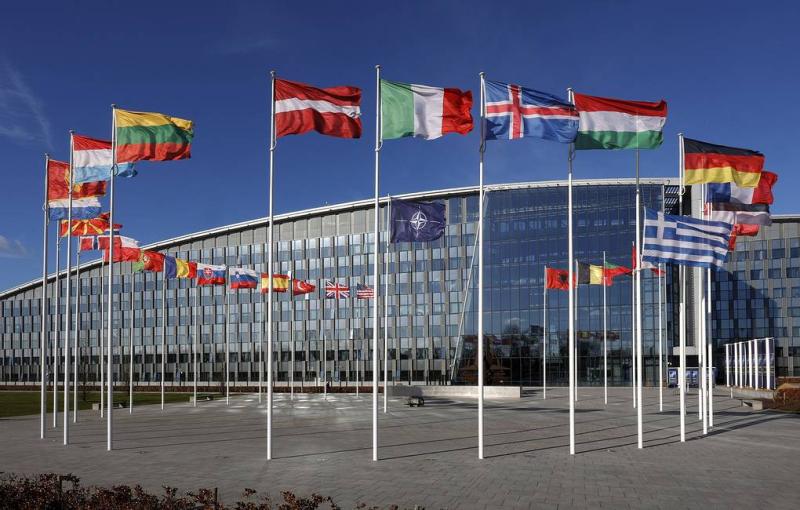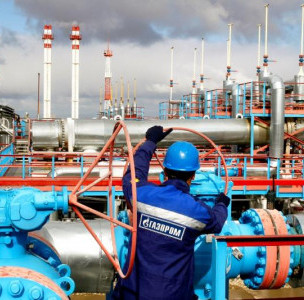
© AP Photo/Olivier Matthys/TASS
Top stories from the Russian press on Monday, November 7th, prepared by TASS
Izvestia: Will UN manage to ensure removal of restrictions on Russian food exports
The United Nations promised to ensure the lifting of restrictions on Russian food exports as part of the grain deal, Russian First Deputy Permanent Representative to the UN Dmitry Polyansky told Izvestia. The newspaper’s source said that the UN secretary general was in talks with major insurance companies to lower prices for Russian ships. However, Moscow hasn't seen any results yet.
Polyansky explained that Russia expected the UN to take specific steps for the lifting of export restrictions and viewed November 18 - the day when the agreement on Ukrainian grain exports would expire - as "the logical deadline." "When making a decision [on extending the accords], we will look at how effectively the Russia-related part of the deal is implemented and the results of the UN’s efforts in this regard," the diplomat pointed out.
Two informed sources told Izvestia that the UN chief assured Russian Foreign Minister Sergey Lavrov at a meeting on the sidelines of the UN General Assembly that he was actively engaged in talks. One of the sources said that "the deal’s extension still remains a subject of negotiations because Moscow did not receive any guarantees concerning free access of grain to the global market as of early November."
Turkish political scientist Kerim Has told the paper that he did not expect any radical changes in the policy of sanctions against Moscow even given the UN’s mediation efforts within the grain deal. However, the US and European countries could possibly ease the restrictions on Russian food exports.
Political analyst Onur Sinan Guzaltan believes that the United Nations won’t be able to ensure the lifting of restrictions on Russia because the move runs counter to Washington’s policy of isolating Moscow. According to the expert, Ankara has better chances of finding a compromise than the UN chief as it maintains good relations with the EU, the US and Russia.
Nezavisimaya Gazeta: NATO seeks to persuade Turkish leader to let Sweden, Finland join bloc
Swedish Prime Minister Ulf Kristersson is going to Ankara to try to persuade Turkish President Recep Tayyip Erdogan to stop obstructing Sweden and Finland from joining NATO. Some believe that Erdogan may delay the ratification of an agreement on the two countries’ accession to the bloc until the next Turkish presidential election, set to take place in June 2023, Nezavisimaya Gazeta writes.
Turkey remains the last NATO member who is reluctant to ratify the agreement. Meanwhile, NATO Secretary General Jens Stoltenberg said following a meeting with Erdogan on November 5 that Finland and Sweden fully complied with the memorandum that they had signed with Turkey at NATO’s Madrid summit on June 28, 2022. According to the memorandum, Helsinki and Stockholm particularly agreed to cooperate with the Turkish authorities in the fight against the Kurdistan Workers’ Party and its branches, abandon cooperation with the FETO organization and lift an embargo on weapons supplies to Turkey. The question is how the signatories view cooperation in the fight against terrorism.
Senior Researcher at the Russian Academy of Sciences’ Primakov Institute of World Economy and International Relations Viktor Nadein-Rayevsky points out that the Swedes have already made a number of important concessions by agreeing to condemn the activities of the Kurdistan Workers’ Party. Meanwhile, Ankara keeps making demands that often run counter to the Swedish constitution, including the demand to remove Kurdish members from the country’s parliament. "Sweden cannot make unlimited concessions even for the sake of joining NATO. This is what the Swedish authorities are trying to explain. But Erdogan despises such nonsense as democratic norms, which is why he demands not just a ban on the Kurdistan Workers’ Party but also the extradition of all its members and all those whom Turkey views as such, as a rule based on very indirect evidence," the analyst noted.
According to Nadein-Rayevsky, it’s quite possible that the Turkish leader will delay the ratification of the agreement until the end of the year or even the next presidential election.
Vedomosti: West falls short on funding poor countries’ struggle against climate change
The COP27 UN Climate Change Conference has kicked off in Egypt. The main issue on the event’s agenda is the richest countries’ failure to keep their promise to fund the poorest nations’ fight against climate change. The wealthiest one-percent account for 48% of the global carbon footprint, yet it is the poorest ones that suffer the most from the consequences. In the past two years, the donor countries cited issues related to the coronavirus pandemic and now, supporting Kiev is a priority, Vedomosti notes.
Although poor nations are at the forefront of the climate crisis, it was the developed countries that caused it, Director of the Climate and Energy Program at WWF Russia Alexey Kokorin emphasized. The West believes that it is doing the developing countries a favor, with the latter rightfully considering themselves to be the aggrieved party, Head of the Moscow State University’s Laboratory of Global and Regional Geoecology Nikolay Dronin noted.
As for Russia, the country planned to attract up to 600 bln rubles ($9.6 bln) of investment into climate projects by 2024, which could have increased the absorption capacity of Russian ecosystems by ten percent. However, funding the fight against climate change stipulated interaction with Western countries in terms of selling commodities and avoiding the carbon tax. "These issues in fact don’t matter anymore," Head of Climate Change Research at the State Hydrological Institute Oleg Anisimov emphasized. At the same time, the amount of emissions is approximately equal to absorption amounts, Dronin noted, while Russia is one of the world’s leaders for the emission ratio per forest area.
Some countries still expect Russia to contribute to sustainable development. "If building nuclear power plants in Egypt, India and Bangladesh is not a contribution to zero-carbon technologies, then what is? If we consider these efforts the way the West does, then it turns out that Russia makes a significant contribution to the fight against global warming," Dronin argued.
Izvestia: Russian researchers find faster and cheaper way to deliver spacecraft to orbit
Russian researchers are working on the first domestic booster for superlight space rockets, which will be capable of delivering spacecraft to orbits higher than those that carrier rockets reach. Developers expect that the booster will make it possible to step up and ease satellite launches, Izvestia writes.
"The booster is innovative because of its so-called platform configuration, which provides for its maneuvering in a wide range of operational altitudes," Leading Researcher at the InterPolyaris Research and Production Association Tatyana Basharina pointed out. "The control system and the engine unit are the permanent components of the booster. The engine unit is the most science-intensive and expensive device. It runs on environmentally friendly fuel components, that is, ethyl alcohol and oxygen. A system to store and supply fuel components and the module frame are the variable parts adapting to space missions," she added.
According to developers, such an approach makes it possible to create a universal booster for all types of rockets and cargo.
"Usually, carrier rockets deliver useful payloads into low Earth orbit at an altitude of 200 to 250 kilometers," Bauman Moscow State Technical University Professor Ivan Sobolev explained. "However, spacecraft cannot exist there for long as they lose altitude due to residual atmospheric drag and burn in the lower atmosphere within several months or even weeks. This is why a booster may be needed to deliver them to higher altitudes. Besides, sometimes there is a need to change the orbit’s shape and this is where it will also come in handy. Finally, a booster can take a spacecraft on a flight trajectory to the moon and even farther," he said.
According to Sobolev, a booster can also be used for the delivery of several spacecraft, launched by the same carrier rocket, to different orbits. This will make it possible to save a lot of money on launches, he added.
Nezavisimaya Gazeta: West seeks to reduce Russian oil export revenues
Europe’s embargo on Russian oil and the anti-Russian alliance’s price restrictions will take effect in a month. The $60 price cap that is currently under consideration in the West is only slightly different from the discounted price at which Russian companies have to sell oil to new customers, Nezavisimaya Gazeta notes.
Some experts see advantages for Russia in such a mechanism, which could turn out to be a compromise. "The advantage is that when Russian oil is sold at a price lower than $60 per barrel, then all sanctions on the Russian oil industry automatically stop working," Executive Director of the Capital Markets Department at Iva Partners Artem Tuzov emphasized. "It means that when oil prices fall from the current $90 level to the $60 mark on the global market, which has repeatedly happened, Russian oil producers may offset declining revenues by increasing supplies," he explained.
"If Greek tankers are ready to transport Russian oil to India, for instance, only if prices spelled out in contracts don’t exceed the limit of $60 or $70 per barrel, then such an option is quite possible. The Russian government will not ban such supplies because in terms of prices, they will be in line with the current sales. Given the discount that we offer to our customers, this is the price that oil was sold at. In fact, the Russian government will simply refrain from preventing Russian companies from offering discounts to their customers, which is what they have been doing since the spring of 2022. This will be officially a discount and not a price cap," said Leading Expert at the Financial University and the National Energy Security Fund Stanislav Mitrakhovich said.
However, this will be a temporary compromise, the expert warns. It may collapse at some point, particularly when the price cap will be revised and lowered.









